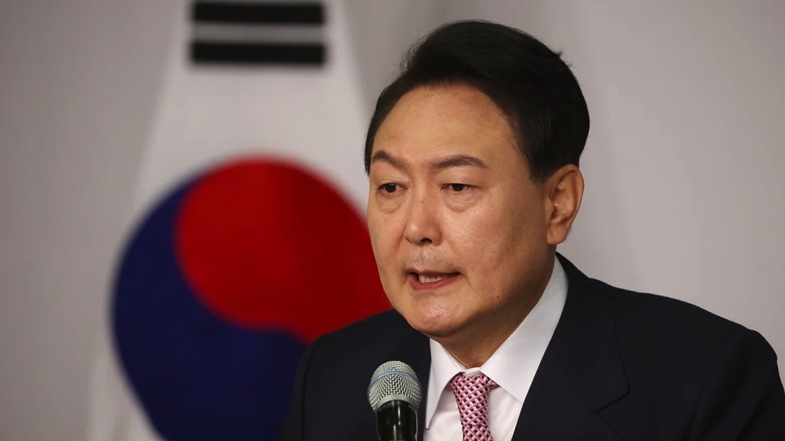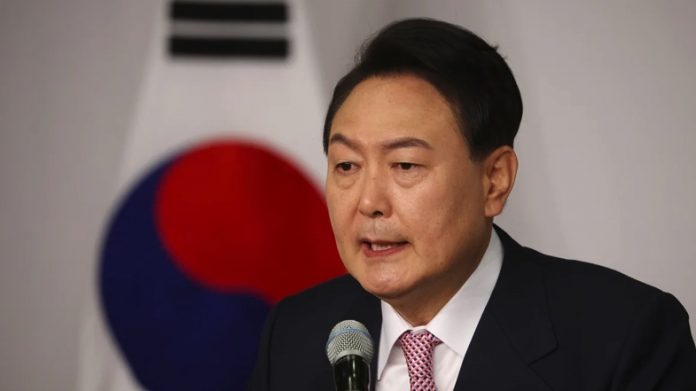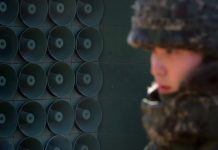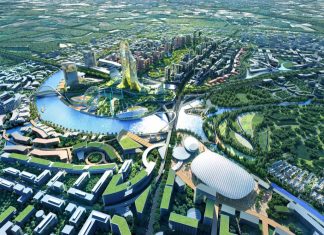กรุงโซล, เกาหลีใต้
เกาหลีใต้เตรียมเข้าสู่การเผชิญหน้าทางการเมืองครั้งใหญ่ในสัปดาห์นี้ เมื่อกระบวนการถอดถอนประธานาธิบดียุน ซอกยอล ซึ่งถูกพักงานกำลังเริ่มต้นขึ้น ในขณะที่เขายังคงกักตัวอยู่ในที่พักที่มีการป้องกันอย่างแน่นหนา เพื่อหลีกเลี่ยงการถูกจับกุมในคดีอาญาอื่น
การประกาศกฎอัยการศึกในช่วงสั้น ๆ ของยุนเมื่อเดือนธันวาคม ได้จุดกระแสความไม่พอใจและการประท้วงอย่างกว้างขวางในสาธารณชน และนำพาประเทศเข้าสู่วิกฤตทางการเมืองครั้งใหญ่ที่สุดในรอบหลายทศวรรษ
ยุนได้ปิดกั้นตัวเองอยู่ในที่พักบนเนินเขาที่กรุงโซล โดยมีทีมรักษาความปลอดภัยประธานาธิบดี (PSS) คุ้มกัน ขณะที่นอกประตูรั้วมีกลุ่มผู้สนับสนุนสายอนุรักษ์นิยมของเขาหลายร้อยคนที่ให้คำมั่นว่าจะปกป้องเขา
ยุนได้ส่งสัญญาณผ่านทนายความของเขาว่าเขาจะไม่เข้าร่วมการพิจารณาคดีถอดถอนครั้งแรกในวันนี้ โดยอ้างถึงความกังวลด้านความปลอดภัยที่เกี่ยวข้องกับความพยายามในการควบคุมตัวเขาเพื่อสอบปากคำ ตามรายงานของสำนักข่าวยอนฮับของเกาหลีใต้
อดีตอัยการที่ผันตัวมาเป็นนักการเมืองคนนี้ ถูกปลดออกจากอำนาจประธานาธิบดีเมื่อเดือนที่แล้ว หลังจากการประกาศกฎอัยการศึก และเป็นที่ต้องการตัวในการสอบสวนหลายกรณี รวมถึงข้อกล่าวหาว่าเขาเป็นผู้นำการก่อการจลาจล ซึ่งเป็นอาชญากรรมที่มีโทษจำคุกตลอดชีวิตหรือประหารชีวิต
ยุนยืนยันว่าเขาดำเนินการอย่างถูกต้องตามกฎหมายในการประกาศกฎอัยการศึก และถือว่าหมายจับดังกล่าว “ผิดกฎหมายและไม่ถูกต้อง” เขาได้บอกกับผู้สนับสนุนว่าเขาจะ “ต่อสู้จนถึงที่สุด”
กลุ่มผู้สนับสนุนกังวลว่ายุนอาจถูกจับกุมหากเขาออกจากที่พักเพื่อเข้าร่วมการพิจารณาคดีถอดถอน ขณะที่กลุ่มผู้ประท้วงฝ่ายตรงข้ามได้ฝ่าฟันสภาพอากาศหนาวเย็นเพื่อเรียกร้องให้มีการจับกุมเขา
นักสืบคดีคอร์รัปชันมุ่งมั่นที่จะดำเนินการตามหมายจับยุน ซึ่งนับเป็นครั้งแรกที่มีการดำเนินการเช่นนี้กับประธานาธิบดีที่ยังดำรงตำแหน่ง
ความตึงเครียดปะทุขึ้นเมื่อต้นเดือนนี้ เมื่อเจ้าหน้าที่พยายามจับกุมยุนที่ที่พักของเขา ส่งผลให้เกิดการเผชิญหน้าที่ยืดเยื้อหลายชั่วโมง ระหว่างตำรวจหลายสิบคนกับ “กำแพงมนุษย์” ที่ประกอบด้วยทหารประมาณ 200 นายและสมาชิกทีมรักษาความปลอดภัยประธานาธิบดี
ความพยายามจับกุมครั้งนั้นถูกยกเลิกในภายหลัง โดยเจ้าหน้าที่ให้เหตุผลเรื่องความปลอดภัยของผู้คนในพื้นที่ แม้ว่าหมายจับจะได้รับการขยายเวลาออกไป
ในความพยายามที่จะขัดขวางการจับกุมครั้งที่สองซึ่งคาดว่าจะเกิดขึ้น มีการติดตั้งลวดหนามบนกำแพงรอบที่พัก และปิดกั้นทางเข้าด้วยยานพาหนะ ตามวิดีโอที่เผยแพร่เมื่อสัปดาห์ที่แล้วโดยพันธมิตรของ CNN อย่าง JTBC
ยุนยังได้ยื่นฟ้องทางกฎหมายต่อผู้ที่พยายามจับกุมเขา รวมถึงหัวหน้าหน่วยงานต่อต้านคอร์รัปชันของรัฐ
ชะตากรรมทางการเมืองอยู่ในมือของศาลรัฐธรรมนูญ
ยุนได้ถอนคำประกาศกฎอัยการศึกที่เขาออกเมื่อช่วงกลางดึกของวันที่ 3 ธันวาคมอย่างรวดเร็ว หลังจากที่สมาชิกสภานิติบัญญัติฝ่าด่านกองกำลังรักษาความปลอดภัยเพื่อเข้าสู่รัฐสภาและลงมติไม่เห็นชอบต่อคำสั่งดังกล่าว
จากนั้นสมัชชาแห่งชาติได้ลงมติถอดถอนยุน หลังจากที่สมาชิกหลายคนในพรรคของเขาเองหันมาต่อต้านเขา นอกจากนี้ รัฐสภายังลงมติถอดถอนนายกรัฐมนตรีและรักษาการประธานาธิบดีฮัน ด็อกซู โดยขณะนี้รัฐมนตรีว่าการกระทรวงการคลัง ชเว ซังมก ดำรงตำแหน่งรักษาการประธานาธิบดี
ศาลรัฐธรรมนูญของประเทศมีอำนาจตัดสินชี้ขาดเกี่ยวกับชะตากรรมทางการเมืองของยุนและฮัน และจะพิจารณาว่าจะถอดถอนพวกเขาออกจากตำแหน่งอย่างเป็นทางการหรือคืนสถานะ
การพิจารณาคดีของยุนจะเริ่มขึ้นในวันอังคาร โดยมีกำหนดการไต่สวนปากคำ 5 ครั้ง จนถึงวันที่ 4 กุมภาพันธ์ หากยุนไม่ปรากฏตัวในวันอังคาร การไต่สวนครั้งที่สองจะดำเนินการต่อในวันพฤหัสบดี โดยไม่ขึ้นกับการปรากฏตัวของเขา
ศาลมีเวลาถึง 180 วันในการตัดสินว่าจะยืนยันหรือปฏิเสธการลงมติถอดถอน และได้ให้คำมั่นที่จะจัดลำดับความสำคัญของคดีนี้
การพิจารณาคดีของศาลยุ่งยากขึ้นเนื่องจากปัจจุบันศาลที่มีสมาชิก 9 คน มีผู้พิพากษาเพียง 8 คน เนื่องจากความล่าช้าในการแต่งตั้งผู้แทนที่ผู้พิพากษาที่เกษียณอายุ
รักษาการประธานาธิบดีชเวเพิ่งแต่งตั้งผู้พิพากษา 2 คน จาก 3 ตำแหน่งที่ว่างในศาลโดยรัฐสภา และตำแหน่งที่เหลือจะได้รับการพิจารณาโดยศาลภายในเดือนนี้
ตามรัฐธรรมนูญของเกาหลีใต้ จำเป็นต้องมีผู้พิพากษาอย่างน้อย 6 คนที่เห็นชอบการถอดถอนเพื่อให้คำตัดสินมีผลบังคับใช้
หากศาลรัฐธรรมนูญยืนยันการถอดถอนยุน เขาจะกลายเป็นประธานาธิบดีที่ดำรงตำแหน่งสั้นที่สุดในประวัติศาสตร์ประชาธิปไตยของเกาหลีใต้ ประเทศจะต้องจัดการเลือกตั้งประธานาธิบดีใหม่ภายใน 60 วัน
การสอบสวนทางอาญา
ในขณะที่ยุนถูกระงับการใช้อำนาจประธานาธิบดี เขายังไม่ได้ถูกถอดถอนจากตำแหน่งอย่างเป็นทางการ ซึ่งหมายความว่าเขายังคงได้รับสิทธิ์พิเศษจากตำแหน่งประธานาธิบดีในการคุ้มครองจากข้อกล่าวหาทางอาญาส่วนใหญ่ ยกเว้นกรณีการกบฏหรือการทรยศ
ตำรวจทหารและหน่วยงานต่อต้านคอร์รัปชันของเกาหลีใต้ได้จัดตั้งทีมสอบสวนร่วมเพื่อพิจารณาข้อกล่าวหาการกบฏและการละเมิดอำนาจของยุน ในขณะเดียวกัน อัยการกำลังสอบสวนบุคคลสำคัญที่เกี่ยวข้องกับการปฏิบัติการกฎอัยการศึก รวมถึงผู้บังคับบัญชาและรัฐมนตรีกลาโหม
ยุนปฏิเสธที่จะตอบรับหมายเรียก 3 ครั้งในช่วงหลายสัปดาห์ที่ผ่านมา โดยอ้างถึงคำขอความร่วมมือจากสำนักงานการสอบสวนคอร์รัปชันของเจ้าหน้าที่ระดับสูง (CIO)
ในขณะเดียวกัน นักสอบสวนคอร์รัปชันดูเหมือนว่าจะเดินหน้ากับความพยายามครั้งที่สองในการจับกุมประธานาธิบดีที่ถูกระงับการทำงาน
เมื่อวันอาทิตย์ CIO กล่าวว่าพวกเขาได้ขอความร่วมมือจากกระทรวงกลาโหมและทีมรักษาความปลอดภัยประธานาธิบดีในการบังคับใช้หมายจับและหมายค้นกับยุน
ส่วนใหญ่ของการวิจารณ์ได้ตกอยู่ที่ทีมรักษาความปลอดภัยประธานาธิบดี PSS ซึ่งถูกกล่าวหาว่าทำหน้าที่เหมือนผู้คุ้มกันส่วนตัวของยุน ก่อนหน้านี้ CIO กล่าวว่าสิ่งนี้ทำให้ “การดำเนินการหมายจับ” ที่บ้านของยุนแทบจะเป็นไปไม่ได้ในขณะที่การรักษาความปลอดภัยยังคงอยู่
ในวันอาทิตย์ CIO ขอให้กระทรวงกลาโหมตรวจสอบให้แน่ใจว่าทหารที่ถูกส่งไปยังทีมรักษาความปลอดภัยของยุนจะไม่ขัดขวางความพยายามในการจับกุมเขา
นอกจากนี้ยังกล่าวว่า ทีมรักษาความปลอดภัยควรหลีกเลี่ยงการกระทำที่ “ผิดกฎหมาย” เช่น การใช้บุคลากรด้านความปลอดภัยในการทำงานนอกเหนือจากหน้าที่ของพวกเขา และเตือนว่า การขัดขวางอาจส่งผลให้ถูกดำเนินคดีทางอาญา
ยังมีความสับสนเกี่ยวกับหน่วยงานใดที่มีอำนาจในการดำเนินการหมายจับ ทนายความของยุนในวันจันทร์กล่าวหาว่าตำรวจมีส่วนเกี่ยวข้องในการ “จับกุมที่ผิดกฎหมายและการละเมิดอำนาจ” และว่า “หลักฐานใดๆ ที่ได้จากการกระทำดังกล่าวจะถือว่าเป็นการละเมิดกฎหมาย”
ทนายความของยุนโต้แย้งว่า หมายจับควรถูกดำเนินการโดย CIO ไม่ใช่ตำรวจ แต่กฎหมายเกาหลีใต้ระบุว่า ตำรวจได้รับอนุญาตให้ช่วยเหลือหน่วยงานอื่นๆ ในการปฏิบัติภารกิจสาธารณะ
เมื่อวันศุกร์ หัวหน้าทีม PSS ของยุน ปาร์ค จองจุน ได้ยื่นใบลาออกก่อนที่จะถูกสอบปากคำโดยตำรวจเกี่ยวกับบทบาทของเขาในการขัดขวางการจับกุมยุน ตามข้อมูลจากทีมรักษาความปลอดภัย
เมื่อหมายจับถูกบังคับใช้ จะเริ่มนับเวลา 48 ชั่วโมงสำหรับนักสอบสวนในการควบคุมตัวและสอบปากคำยุน CIO จะต้องยื่นคำขอหมายจับใหม่ในช่วงเวลานั้นเพื่อทำการจับกุมเขาอย่างเป็นทางการ
Dramatic showdown looms in South Korea as Yoon faces impeachment trial and possible arrest

Seoul, South Korea
CNN
South Korea looks set for a dramatic political showdown this week as impeachment proceedings kick off against suspended President Yoon Suk Yeol, who remains holed up in his fortified residence evading arrest for a separate criminal investigation.
The embattled leader’s short-lived declaration of martial law in December triggered widespread public outrage and protests, and plunged the country into its biggest political crisis in decades.
For weeks, Yoon has barricaded himself in his hillside compound in the capital Seoul, surrounded by his Presidential Security Service (PSS) team, while outside the gates hundreds of his die-hard conservative supporters have vowed to protect him.
Yoon has indicated through his lawyer that he will not attend the first formal hearing in his impeachment trial on Tuesday, citing safety concerns relating to efforts to detain him for questioning, according to South Korea’s Yonhap News Agency.
The former prosecutor-turned-politician was stripped of his presidential powers last month after his declaration of martial law, and is wanted for questioning in multiple investigations, including allegations he led an insurrection – a crime punishable by life imprisonment or even the death penalty.
Yoon maintains he acted legitimately in declaring martial law and considers the warrant “illegal and invalid.” He has told his supporters that he will “fight until the end.”
Supporters are concerned Yoon will be detained if he leaves his residence to attend the impeachment hearings. Rival protesters have also braved cold conditions to call for his arrest.
Corruption investigators are determined to execute the arrest warrant against Yoon – the first time such action has been taken against a sitting president.
Tensions exploded earlier this month when investigators attempted to detain Yoon at his residence, resulting in a dramatic hours-long standoff between dozens of police and a “human wall” of around 200 soldiers and members of the presidential security detail.
The arrest attempt was later called off with investigators citing the safety of the people on the ground, though the arrest warrant was extended.
In an apparent effort to thwart a second expected attempt to detain Yoon, barbed wire has been erected on walls around the compound and entrances have been blocked by vehicles, according to video shared last week by CNN affiliate JTBC.
Yoon has also filed legal complaints against those who tried to arrest him including the head of the state anti-corruption agency.
Political fate in hands of top court
Yoon swiftly rescinded his late-night martial law declaration on December 3, after lawmakers pushed past security forces blocking their way into parliament and voted down the decree.
The National Assembly then voted to impeach Yoon after several members of his own ruling party turned on him. Parliament also voted to impeach the country’s prime minister and acting president Han Duck-soo. The finance minister, Choi Sang-mok, is now acting president.
The country’s Constitutional Court has the ultimate say over Yoon and Han’s political fate, and will determine whether they will be formally removed from their positions or reinstated.
Oral arguments for Yoon’s trial start Tuesday, with five sessions scheduled until February 4. If Yoon fails to appear on Tuesday, a second hearing will proceed on Thursday, with or without him in attendance.
The court has up to 180 days to decide whether to uphold or reject the impeachment vote, and vowed to make the case a “top priority.”
Complicating the court’s deliberations is that the nine-member court currently only has eight justices, due to a delay in filling vacancies left by retired justices.
Acting President Choi recently filled two out of three vacancies on the court appointed by the parliament, and the remaining position will be reviewed by the court later this month.
Under South Korea’s constitution, at least six justices must approve an impeachment for it to be upheld.
If the Constitutional Court upholds Yoon’s impeachment, he would become the shortest-serving president in South Korea’s democratic history. The country must then hold new presidential elections within 60 days.
Criminal investigations
While Yoon has been suspended from exercising his powers, he has not been officially removed from office. That means he still has presidential immunity from most criminal charges – except for insurrection or treason.
South Korea’s police, military, and anti-corruption body have formed a joint investigation team to examine the charges of insurrection and abuse of power against Yoon. Meanwhile, prosecutors are investigating key figures involved in the martial law operation, including commanders and the defense minister.
Yoon has refused to answer three summonses in recent weeks asking for his cooperation, according to the Corruption Investigation Office for High-ranking Officials (CIO.)
Meanwhile, corruption investigators appear to be pushing ahead with their second attempt to arrest the suspended president.
On Sunday, the CIO said it had asked the Defense Ministry and presidential security team for cooperation with enforcing the arrest and search warrant against Yoon.
Much of the spotlight has fallen on the presidential security team, the PSS, which has been accused of acting like Yoon’s personal bodyguards. Previously, the CIO said “it is virtually impossible to execute a warrant” at Yoon’s residence while security there remains in place.
The CIO on Sunday asked the country’s defense ministry to ensure soldiers dispatched to the security team protecting Yoon do not disrupt efforts to arrest him.
It also said the security team should avoid an “illegal act” such as mobilizing security personnel for jobs outside of their duties, and warned that disruption could result in criminal punishment.
There is also some confusion as to which agency has jurisdiction to carry out the arrest warrant. Yoon’s lawyers on Monday accused the police of being complicit in an “illegal arrest and abuse of power,” and that “any evidence obtained through such actions would be deemed illegal.”
Yoon’s lawyers argue the warrant should be executed by the CIO, not the police. South Korean law, however, states that police are authorized to assist other authorities in carrying out public duties.
On Friday, the head of Yoon’s PSS, Park Chong-jun, submitted his resignation before undergoing police questioning over his role in blocking Yoon’s arrest, according to the security team.
Once the warrant has been enforced, it starts a 48-hour countdown for investigators to hold and question Yoon. The CIO would need to apply for another warrant within that period to formally arrest him.
By Helen Regan, Gawon Bae and Yoonjung Seo, CNN

















